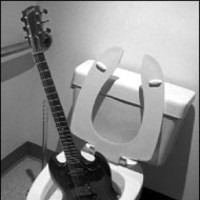The music industry is powered by four crucial engines: record labels, radio, the touring industry and retail record stores. And they are all sputtering with a grim array of problems.
Napster is hobbled, but music swapping online remains a gleeful pleasure for millions of computer users who have lost interest in actually paying for CDs. Venerable record chains like Tower Records have been on the verge of going out of business. The alternative-rock/country/rap explosion of the 1990s is over, and few new acts are selling even as consumers are turning up their noses at superstar perennials, too.
Major labels have been battered by losses and layoffs, radio station owners are wallowing in an advertising recession, and the concert business lost millions of ticket buyers in just the last year.
Meanwhile, an increasingly large number of usually obedient artists are making noises about staging an unprecedented open revolt, determined to win from record companies what they insist is their fair share of the profits.
"It's not a pretty picture," says longtime music attorney Jay Cooper. "In fact it's an awful picture. This is not business as usual, or a periodic downturn."
Cooper argues that the current slump represents more than just the latest dip in the music business' familiar cyclical pattern. He says fundamental problems exist that cannot be fixed no matter what new, potent musical tend is lurking on the horizon.
Others disagree. "There's an awful lot of Chicken Little, but the sky is not falling," insists Frank Callari, senior vice president of A&R at Lost Highway Records, home to Lucinda Williams, among others. "I'm pretty optimistic." ("A&R," standing for "artists and repertoire," is the industry's name for the execs who sign acts.)
High ticket prices gut the concert business
Even for the industry optimists, the first quarter of 2000, when sales were up 12 percent over the previous year, must now seem like a lifetime ago. By contrast, as the final days of 2001 ticked off, music sales were down 5 percent from last year, according to SoundScan, which 10 years ago began tabulating music sales with some exactitude, using scanning technology as albums were purchased. Worse, sales of current releases that's not counting older catalog material, just albums shipped out within the last 18 months were off 6 percent, year-to-date.
The traumatic terrorist attack of September 11 and subsequent consumer fallout, when the concert business virtually came to a standstill and shopping patterns were disrupted for weeks, only exacerbated what had been glaring music industry weaknesses.
"The business is broke and that just accelerated the decline," says one veteran. "This is not a growth industry." (The one bright spot is contemporary Christian and gospel music; sales have spiked since September 11.)
For instance, the concert business was already off 12 percent through the first six months, according to Pollstar magazine. Worse, actual concert attendance fell 16 percent during the first half of the year. Nobody thinks those numbers will improve when the receipts for the second six months of the year are tallied.
"Lots of promoters have been trying to use the Osama excuse," according to one concert industry pro. "But by September 11, the outdoor summer amphitheater season was basically done."
What's the real reason? Some people say it's high ticket prices.
"Weak business has more to do with issues of pricing than the trauma of war," that pro continues.
There are both higher ticket prices and expanding ticket surcharges. For instance, a pair of $49.50 tickets to see Britney Spears at the MCI Center in Washington on December 21 came complete with an astonishing $25.40 worth of add-on service fees. Ticketmaster charges a $15.90 "convenience charge" for the privilege of buying tickets. (Harris-Teeter is prevented from demanding a "convenience charge" for shopping in its stores because the customer has alternatives, a state of affairs that does not apply to Ticketmaster, which handles the fare gate for a large part of the concert industry.) There is an additional $3.50 "handling fee" as well. And finally, there is a $6 "building facility charge," sort of a tax to walk into the MCI Center. (Traditionally, venues like the MCI Center also have some portion of the Ticketmaster fees kicked back to them as well.)
Speaking of Metrobeat.html
-
The Need is Great
Nov 13, 2002 -
Suite Proposition
Oct 23, 2002 -

Lazes Touts Elmwood Area
Oct 9, 2002 - More »
Latest in News
More by Eric Boehlert
-

Music Industry Down The Toilet?
Jan 5, 2001 - More »






